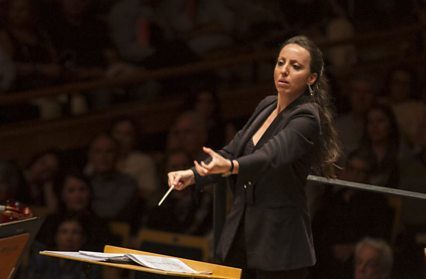Cath Barton attended Hoddinott Hall for BBC National Orchestra of Wales’ celebration of of Augusta Holmès, Clara Schumann, Joan Tower and Florence B. Price for their International Women’s Day Concert.
When I last heard the BBC National Orchestra of Wales give a concert for International Women’s Day, in 2017, I was very disappointed that the bulk of the music they played was by male composers. I was glad to see that not only did they rectify that this year in their concert at Hoddinott Hall for IWD 2019, but that also the concert is part of a longer-term recording project on Forgotten Women Composers. Two of these composers, Augusta Holmès and Florence Price, were featured in this concert.
Augusta Holmès (1847-1903), a Frenchwoman of Irish descent (championed for Forgotten Women Composers by Dr Anastasia Belina) was described by Saint-Saëns as an ‘extremist’. The fact that she had rejected his proposal of marriage may have coloured his view, but it certainly seems that she was extremely determined not just to be a composer, but to write music on a large scale; she was not content to confine her musical ambitions to the salon, the nineteenth century musical equivalent of a woman’s place being barefoot and pregnant in the kitchen.
As she was financially independent after the death of her father, Holmès was able to pursue a career as a composer, and did have orchestral works performed in her lifetime, especially after she became a pupil of César Franck in about 1876, the year in which she composed her three-part symphonic poem Roland Furieux. However, it was still difficult for women composers to be taken seriously in European society in the nineteenth century, and this performance is thought to have been a world premiere of the complete work.
Using the full forces of the symphony orchestra, Roland Furieux begins with a full-throated brass fanfare and continues in robust late-romantic dramatic style through a perhaps over-lengthy woodland idyll to a furious chase to the end. The music is pleasant enough without being ground-breaking, and stands a chance of further performances now that Schott have published the orchestral score.
Clara Wieck (later Schumann) (1819-96) wrote her Piano Concerto in A Minor between the ages of 14 and 16 and performed it in her home town of Liepzig in the year she completed it, 1835. The Georgian pianist Mariam Batsashvili – currently a BBC Radio 3 New Generation Artist – seemed to channel the precocious Clara, who in her lifetime was known primarily for her virtuosic piano playing. And of course for her marriage to Robert Schumann, for whom she sacrificed her own career. So it was in her time.
The piece is delicate and charming, especially the beautifully melodic central Romanze, a duet for piano and cello – here played sensitively by Alice Neary – which with a soft roll on the timps segues into an expansive finale. There were times too, in both the outer movements, when the orchestra was like a purring cat behind the piano melodies; the balance was well achieved, thanks to visiting Italian conductor Valentina Peleggi.
After the interval the music moved to twentieth century America, employing the brass and percussion sections of the orchestra to give us the Second Fanfare for the Uncommon Woman (1989), commissioned by Absolut Vodka (interesting!) from Grammy award-winning composer Joan Tower (b.1938). The work directly references Aaron Copland’s Fanfare for the Common Man, while also standing in tribute to adventurous women. The boldness of her work is compelling.
While UK radio listeners – to Classic FM as well as BBC Radio3 – may well be familiar with Joan Tower’s Fanfares, most will be scratching their heads to think whether they have ever heard any of the music of the African-American composer Florence Price (1887-1953). And here’s why, in her own words, writing in 1943 to the conductor Serge Koussevitsky:
“My dear Dr Koussevitsky, To begin with I have two handicaps – those of sex and race. I am a woman; and I have some Negro blood in my veins.”
Although the unusually broad-minded conductor Frederick Stock had the Chicago Symphony Orchestra play her work, most others in the US musical establishment ignored her, including Koussevitsky. Shockingly, after her death her manuscripts were left to rot in her abandoned summer home, and discovered there only half a century later. Now, thanks to contemporary musicologists – and in particular, in the UK, for the Forgotten Female Composers project, Dr Shirley J Thompson – Price’s music is being heard again.
Price’s Symphony No 3 in C minor is music that sweeps through the wide open spaces of rural America and walks down the back alleys of its cities. It is music of the New World, with echoes of Dvořák before her and her near contemporary Copland. But not only is it Price’s personal vision, it also seems to portray an America that lived up to its ideals, unsullied by hate and conflict. It is uplifting music, full of life, drawing on all the colours of the orchestra – from the bassoon to the celesta, shining out in turn as if under a followspot. The melodies of spirituals are in there, as are the joyous dancing syncopations of the Juba.
Valentina Peleggi – currently making her mark as Mackerras fellow at ENO – directed the ever-excellent players of BBCNOW through the rapidly changing rhythms and moods of Price’s work with assurance and clarity, as indeed she did the whole concert.
Cath Barton’s debut novella, The Plankton Collector, is published by New Welsh Review under their Rarebyte imprint.



 Enjoyed this article? Support our writers directly by buying them a coffee and clicking this link.
Enjoyed this article? Support our writers directly by buying them a coffee and clicking this link.







